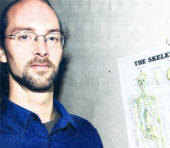
Jenny Monroe talks to Colin Beattie
 COLIN
Beattie, 37, is an Alexander Technique' teacher. The
Alexander Technique is a taught self-help method believed to
help people recognise, understand, and avoid poor habits
affecting postural tone and neuromuscular coordination.
Colin, a former swimmer for Ulster and Ireland, became
interested in the technique, after doing some research on
how to relieve the pain from a back injury he suffered when
he was playing rugby. After training in London at the
Constructive Teaching Centre he started up his open practice
and divides his time between Lisburn and London where he
teaches one day a week at the Teaching Centre.
COLIN
Beattie, 37, is an Alexander Technique' teacher. The
Alexander Technique is a taught self-help method believed to
help people recognise, understand, and avoid poor habits
affecting postural tone and neuromuscular coordination.
Colin, a former swimmer for Ulster and Ireland, became
interested in the technique, after doing some research on
how to relieve the pain from a back injury he suffered when
he was playing rugby. After training in London at the
Constructive Teaching Centre he started up his open practice
and divides his time between Lisburn and London where he
teaches one day a week at the Teaching Centre.
My days are varied. At the moment I come over to Lisburn on a Sunday and then head back to London on a Tuesday. I try to fit in as many of my clients as I can in the short space of time I'm at home.
My teaching room is based at my parent's house on the Quarterlands Road. On average I have eight - 10 clients a day and each session lasts about 45 minutes to an hour. I will talk to the patient and find out their medical history and why they have come along to see me. Usually it is because they are suffering from pain.
I explain what is going to happen and I use my hands to show how they hold themselves during simple everyday activities such as walking, sitting and lying down. I suggest ways to take pressure of the spine and I give a practical demonstration of the person's habits and show them what they are doing and how they can improve on this. It is all about learning and thinking. The Alexander Technique is not about learning to 'hold our bodies correctly' but rather to hold ourselves a bit less. Good posture is not a fixed thing but a dynamic and elastic interaction with our environment more like how we are as children. It feels easy and comfortable. Our instinctual posture works very well as children as it does in animals right through adulthood. Our postural problems lie in unnoticed habitual responses to our repetitive and stressful lives. By learning to recognise and avoid these habits we allow our instincts to function more effectively. As Alexander put it "If we can stop doing the wrong thing the right thing will take care of itself".
The technique teaches people to move and hold their bodies correctly by using frequently forgotten muscles to aid balance, and avoiding poor posture. The method was devised in the 19th century by Frederick Matthias Alexander, a Tasmanian actor who performed in Sydney and Melbourne and was affected by vocal and breathing problems. Seeking a cure he watched himself in the mirror, reciting Shakespearean sonnets, and found the answer appeared to lie in his posture. He had to re-educate both body and mind, he believed, to resist his habits and learn new behaviour. It helps people overcome problems, such as hunching over at the desk or while climbing stairs, by making them aware of overusing some muscles and neglecting others. By bringing greater balance in muscle use it allows the neglected muscles to strengthen without the need for exercise. Problems stem from overusing some muscles and neglecting others in various parts of the body, not just the stomach or back. However, once the imbalance is corrected sufferers are better able to adopt a more upright posture. Sitting correctly becomes more comfortable, reducing the desire to slouch.
It is popular with a host of professions, including performing artists and office workers, and is used by women to cope with labour pains.
Lessons involve an individualised approach designed to provide lifelong skills for self care that can lead to a wide variety of benefits.
In London I teach the technique to swimmers and show them how to move more efficiently in the water. It is a very rewarding job as it not only helps people to get on with their lives but the actual process of practising the technique helps me too. I get to practice what I preach.
Ulster Star
24/10/2008
